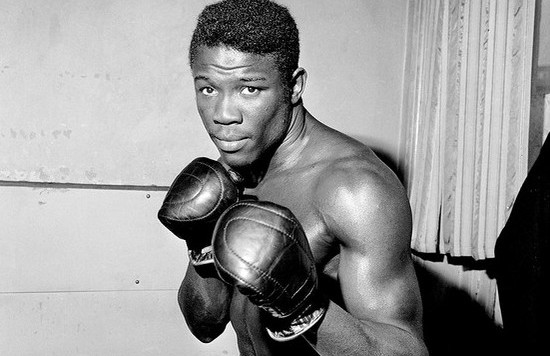Emile Griffith was a five-time world champion in two weight divisions, ranked the 29th greatest fighter of all time by Bert Sugar. Yet he is known largely for two things: that Benny Paret died after their third fight, and that he was gay. The boy who willingly entered a home for wayward youths and orphans to escape an abusive and impoverished family life, and the young man who risked imprisonment for simply being himself have long since been forgotten.
In A Man’s World, South African writer Donald McRae gives the lost elements of Emile Griffith’s life the attention and respect that they deserve (TQBR was provided with a review copy by Simon & Schuster). McRae meticulously recounts Griffith’s career, detailing his opponents, family, and the times themselves. That he is able to weave all of them together is a testament to his research and skill as a storyteller.
McRae often references Griffith’s lilting calypso accent, which does not seem coincidental, since McRae’s prose feels as much like a song as a spoken story. At times, this makes it easy to lose your place. You become so absorbed in the supporting characters and scenery that Griffith seems to fade into the background. Invariably, McRae gently changes focus and the spotlight is returned to the protagonist.
We learn that Griffith had never intended to be a fighter, but was talked into it by his boss, Howie Albert. Griffith went on to win the Golden Gloves and turn pro after two years as an amateur. That he won the welterweight championship in only his third year as a professional is a testament to his amazing natural talent, and his hard work under trainer Gil Clancy.
In A Man’s World, there are three parts to the life of Emile Griffith: his profession as a prizefighter, his home life with his family, and his secret life as a gay man. It is the attempted separation of these parts that appears to have caused Griffith the most angst, especially in the years after Benny Paret’s death. McRae lays bare the guilt, isolation, and horror that Griffith experienced after taking Paret’s life, and it is impossible not to feel sympathy. As Griffith suffers through this time, he is also making huge sums of money, supporting his entire family and trying to keep the press at bay. It is telling of the time that during an interview Griffith invents a story about slapping his girlfriend around for asking him about being gay.
Griffith’s life was not all tragedy and despair. As with many of us, there were people in his life who provided stability and comfort. The almost paternal bond that Howie Albert and Gil Clancy had with Griffith sustained him through his 20-year professional career. When he was harried by family with outstretched hands or simply needed to disappear into his secret life, they ran interference. There was also South African Willie Toweel, an early Griffith opponent who had also killed a man in the ring. When Griffith was at his lowest, a letter of support arrived from Toweel. It was also Toweel who helped Griffith when he stood up to apartheid during a late career trip to South Africa.
A Man’s World is an engrossing read. Fittingly, much of the research was made possible by Griffith’s long-time partner, Luis Rodrigo. And in the epilogue, McRae connects Griffith to junior lightweight Orlando Cruz, demonstrating how much the past means to the present. I heartily recommend buying a copy, whether you’re a boxing fan or not.

